









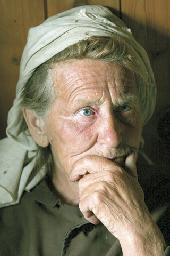 The summer expedition of the “Krasnoyarsk Labourer” was not only interesting
because of all the information received about the railroad system, its
construction and the fact that we became familiar with the history of our
country, but also due to disclosures of an entirely different kind.
The summer expedition of the “Krasnoyarsk Labourer” was not only interesting
because of all the information received about the railroad system, its
construction and the fact that we became familiar with the history of our
country, but also due to disclosures of an entirely different kind.
In Turukhansk we learned a lot about a family of exiled Germans from the village of Goroshikhi, the Stuckerts, a somewhat strange couple who, at old age, made the decision to live in entire harmony with eachother and nature. In the district town which is also called “Little Berlin”, since you find so many Germans surnames there, the names of Ivanov and Petrov seem to sound almost wild and mysterious among all these beckers, Schweffers, Linches (Lindes?), Bros’, Gorrs, Kaisers, Simons, Stiebens and Wagners. With their name the Stuckerts fit perfectly into this community; everybody is used to their family name.
The Turukhansk Region was a region of exiles and forced labour convicts. And, apart from this, of numerous small ethnic groups. On the heyday of geological research, residents from the Baltic States, Belorussians and Ukrainians came to this place to earn money. And for some reason or other theydecided to stay in this place forever. They settled into their new surroundings, assimilated and became “Russians” as their passports had already shown earlier.
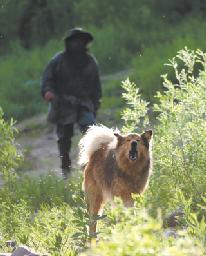 AugustYulitseovich and Lidia Aleksandrovna were both born in the Volga Region,
in the district of Engels, Saratov Region; in 1941 they were deported to Siberia.
At that time the village of Kanashel presented itself as a settlement of
barracks. Already in September it was getting very cold in these make-shift
living quarters. And the people were tormented by hunger. Just like adults the
children were forced to find themselves foodstuffs in the woods, catch fish from
the river ...
AugustYulitseovich and Lidia Aleksandrovna were both born in the Volga Region,
in the district of Engels, Saratov Region; in 1941 they were deported to Siberia.
At that time the village of Kanashel presented itself as a settlement of
barracks. Already in September it was getting very cold in these make-shift
living quarters. And the people were tormented by hunger. Just like adults the
children were forced to find themselves foodstuffs in the woods, catch fish from
the river ...
The children of the exiles were not granted the possibility to attend school, learn how to read and spell words. They were told: “You are Germans! What are you supposed to study after all? See that you put on skies, put dog sledges in front and then go to break the ice open and lay traps!” – At the age of twelve years y boys were forced to go hunting muskrats.
The resettlers could heave a first sigh of relief only after Stalin’s death. When August Yulitseovich learned that there were plans to erect a memorial to the honour of the leader of the proletariate he got very upset and began to complain vehemently. In Kureika they intended to build Josef Vissarionovich a pantheon, while they were not even capable of building a single solid house in Kanashel.
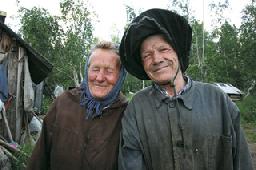 However, they survivied and endured their hard lot. The Stuckerts got a taste of
the first period of thaw under Malenkov’s rule. They mention Krushchev and
Gorbachev, as well. But they have no idea how to rate Putin and his politics.
They find it difficult to say what they think of him.
However, they survivied and endured their hard lot. The Stuckerts got a taste of
the first period of thaw under Malenkov’s rule. They mention Krushchev and
Gorbachev, as well. But they have no idea how to rate Putin and his politics.
They find it difficult to say what they think of him.
Lida and August came to know eachother in Kanashel, where they later got married. They are already preparing for the celebration of their golden wedding anniversary.
They say that in spite of all untoward events they had a happy life. They take great pride in their three children. Mina works for the educational department of the Turukhansk district administration, Irida is the head of the nursery school in Goroshikha, son Aleksander helds the position of the chairman of the Goroshikha village counsil. The Stuckerts have six grandchildren and – there are great-grandchildren, too. Everybody is happy when they come to visit grandma and grandpa in the heart of the taiga.
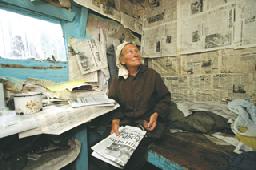 Kanashel itself ceased to exist almost half a century ago. All that remained
from the former village is the cemetery. And such places are sacred to the
Stuckerts. Even bears form part of their family; they are tame. Nobody would
believe their account that they keep company with the Potaps and Potapychs in a
completely free and easy way, as if they were good neighbours. And it is an
astonishing fact what a good nose the bears have, whenever the taiga people make
a good catch, how the look around furtively and then lift the fish all in a
hurry. But they feel ashamed for their crimes, too; they will usually hang their
heads and then, without hesitation, give back the loot they wrongfully got hold
of. And then they leave to hide in their den from shame.
Kanashel itself ceased to exist almost half a century ago. All that remained
from the former village is the cemetery. And such places are sacred to the
Stuckerts. Even bears form part of their family; they are tame. Nobody would
believe their account that they keep company with the Potaps and Potapychs in a
completely free and easy way, as if they were good neighbours. And it is an
astonishing fact what a good nose the bears have, whenever the taiga people make
a good catch, how the look around furtively and then lift the fish all in a
hurry. But they feel ashamed for their crimes, too; they will usually hang their
heads and then, without hesitation, give back the loot they wrongfully got hold
of. And then they leave to hide in their den from shame.
Neither Lida nor August feel sorry for the fish; they are very well aware that you must never feed wild animals, for they will start to loaf instead of getting sufficiently fat, keep staggering through the taiga during the winter and perhaps, Heaven forbid, go for human beings of starvation.
The taiga has its own laws and takes care of its inhapitants in a very meticulous way. The aboriginies know: don’t take away from nature more than you actually need – then you will always have everything you need badly. The Stuckerts strictly observe these laws of nature just as they keep the Ten Commandments. They do not go to church, but talk to God directly, without any intermediary.
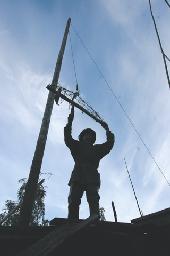 The Stuckerts removed from Goroshikha, where they owned a so-called warm little
corner and lead a regular life, to Kanashel in the 1990s. They only took along
what they needed most badly. In the meantime, their household has become so
extensive that it is time to “dekulakize” it. For good reason they are keeping
seven genuine, strong dogs, which keep close watch on everything; it was a
matter of life and death, and we had no chance to leave the cutter and go
ashore. The dogs kept waiting, until August Yulitseovich told them to let us
pass.
The Stuckerts removed from Goroshikha, where they owned a so-called warm little
corner and lead a regular life, to Kanashel in the 1990s. They only took along
what they needed most badly. In the meantime, their household has become so
extensive that it is time to “dekulakize” it. For good reason they are keeping
seven genuine, strong dogs, which keep close watch on everything; it was a
matter of life and death, and we had no chance to leave the cutter and go
ashore. The dogs kept waiting, until August Yulitseovich told them to let us
pass.
This small, lean man requested his guests perseveringly not to make haste. He learned who we were and where we came from. Afterwards, he wanted to know what had brought us to this place and where we continued our trip; cautiously and with a certain timidity the Stuckerts glanced at our voluminous equipment, all th baggage and cameras.
As it turned out later, their increased caution was a basic mode of behaviour shown by all inhabitants of the taiga. They had made enough strange experience with people coming to take a look at the secluded life in the middle of the taiga. For years ago prisoners had come to this place. While they old people had been working in their vegetable garden breaking up the ground, those strangers had pottered about inside their house. The dogs began to bark and soonafter, August Yulitseovich questioned the men closely: What do you think you are doing? What do you want?
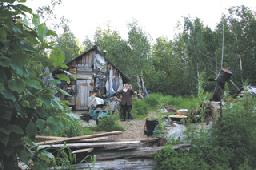 The visitors dragged themselves to the embankment under August’s watchful eyes,
but did not succeed to take the boat and put off. The inhabitants of Kanashel
had already informed the people in near-by Goroshikha about the suspicious
travellers and there they were “welcomed with stretched-out arms”.
The visitors dragged themselves to the embankment under August’s watchful eyes,
but did not succeed to take the boat and put off. The inhabitants of Kanashel
had already informed the people in near-by Goroshikha about the suspicious
travellers and there they were “welcomed with stretched-out arms”.
The more since one of the passengers had been wanted by federal investigating officers since long. The wanderers did not expect this kind of a razzia at the Stuckert’s remote place of residence.
By the way, the two old people rarely make use of the existing telephone connection. Children and grand-children often come to visit them, anyway. They bring along everything needed. Up to now health has not let them down, either. They do not take any pills, although they are already over 70.
Our couple from Kanashel disposes of a delicate sense of hearing; they have good eyes. Elsewise, maybe, they would get lost in the taiga. In all weathers, even in frost, they go fishing and hunting. When everything is deep in snow and the sun is shining, their little glade gleams like gold. Even the dogs seem to be delighted by this beautiful, fairy-tale landscape!
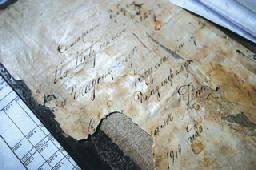 The Stuckerts have a very special relationship with their four-legged
companions. The treat them like family members. And each dogs lieves in its own
house – which is not just a little dog kennel, but a real house. It does not
even compare with the former barracks of Kanashel, which were built for exiled
Germans at that time.
The Stuckerts have a very special relationship with their four-legged
companions. The treat them like family members. And each dogs lieves in its own
house – which is not just a little dog kennel, but a real house. It does not
even compare with the former barracks of Kanashel, which were built for exiled
Germans at that time.
A couple of dogs were immediately running towards us. More than the others Ryzhik was dancing attendance around our legs. August told us that Ryzhik, like all redheads (both human beings and animals) was a rather cunning and roguish creature. Once it had saved his life from a possible bears’s attack. Just by accident the dog had noticed that its master forgot to take along his gun. It ran behind the clumsy bear, distracted its attention to himself, thus leading him further and further into the forest, so that the man had a fair chance to return to his cottage safely.
The most savage dog, the leader of the pack of hounds, was locked in his dog house. According to what August Yulitseovich told us, this dog means a real horror, a real threat to strangers. The other dogs obey it. If the received the command to attack someone, they would run off so energetically that even their master would be unable to hold them back. Fortunately, such kind of a situation has never come up so far. August and Lida from kanmashel are peace-loving people, and when they see that you have not come on evil intent, they will always receive you hospitably.
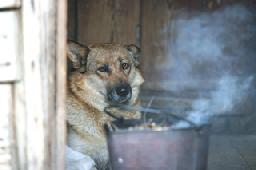 In the past, they have already been visited by a few Germans. Not by exiles, but
by young, free Germans who told them about everyday life in the west. For August
and Lida it was hard to understand what they were talking about. And they did
not envy them, either. One of their own sisters lives in their historic home
country. In her letters she writes about all the problems she is confronted with
and how limited is the number of people she is on friendly terms with.
In the past, they have already been visited by a few Germans. Not by exiles, but
by young, free Germans who told them about everyday life in the west. For August
and Lida it was hard to understand what they were talking about. And they did
not envy them, either. One of their own sisters lives in their historic home
country. In her letters she writes about all the problems she is confronted with
and how limited is the number of people she is on friendly terms with.
In Kanashel, however, this mystic Kanashel, they feel fine and - they are free. Although the Siberian taiga presents itself from its harsh side by its swarms of mosquitos during the summer and severe, crisp frost in the winter, it is at the same time nice to live there; the taiga can be good as a mother, as well. A quarter of a century ago, fed up with the never-ending winter, the Stuckerts had tried to assimilate in Middle Asia, but they could not. Night after night they were dreaming of the Yenisey and … the birch trees in their beloved Kanashel.
This is the story they opened up before us. And it was not the only discovery we made. The fact that the Stuckerts have been subscribing to the “Krasnoyarsk Labourer” for many years amazed us even more. Their son from Goroshikha supplies them with the latest numbers. We have seen Erinat’s report … fixed on the wall of the make-shift oven. And the walls inside the house are also lined with pages of the “Krasnoyarsk Labourer”, just as if they were wall-papers. We read the latest number with utmost interst ourselves, for it had been edited by the editorial staff during our absence, i.e. without our participation – while we had been roaming through the swamps of the Turukhansk District researching Stalin’s railroad.
(To be continued)
Tatiana MAKOGONOVA
Photos: Aleksander KUZNETSOV
“Krasnoyarsk Labourer”, 10.09.05